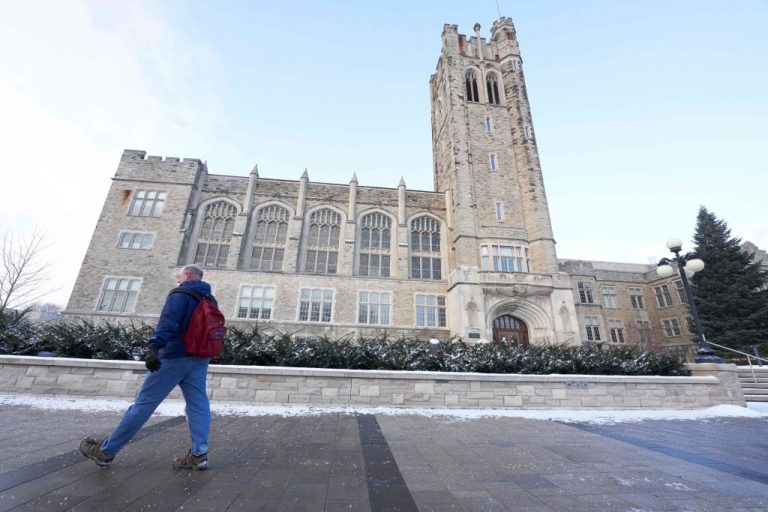The ivory tower appears to be built on an unsettling foundation.
University students in Canada are facing the effects of institutional failure, leading to a decline in writing ability, lack of critical thinking skills, and lower international test rankings.
Political science professor Travis Smith calls this a “failure to train students in the use of rhetoric” and other necessary skills in a recent article by the Epoch Times.
According to Smith, atrophic manifestations result from an academic culture void of independent thinking and intellectual risk-taking. The professor also mentioned that students struggle to write material that may diverge from perspectives given in class.
“Education has become highly ideological,” he noted.
Success
You are now signed up for our newsletter
Success
Check your email to complete sign up
RELATED ARTICLES:
- Yale’s COVID Policies Have Turned the Institution Into a Peer-driven ‘Surveillance State’: Report
- Jordan Peterson Resigns From Tenured Professor Position at the University of Toronto, Cites ‘DIE’
- ‘Deeply Concerned’ Canadian Province Orders Top Universities to Suspend Projects With China
Other professors have noticed similar issues in their departments. David Livingstone, professor of liberal and political studies at the University of Vancouver, recounted one story about how none of his students understood the details of the Canadian electoral system.
In particular, Livingstone mentioned how none under his tutelage could explain how Justin Trudeau became Prime Minister during the last federal election despite obtaining less than 33 percent of the vote.
Another professor, who chose to remain nameless, shared similar observations, noting that graduate students with university-level experience in political science “have very little knowledge of history and very little knowledge of how the Canadian government system is supposed to work.”
The nameless professor described the situation as an “institutional failure” of publicly-funded universities.
Gradual decline
Concern surrounding the inability of post secondary students to rise to the challenges provided to them have grown over the past decade and are showcased through troubling statistics.
A 2019 Fraser Institute blog post noted that while the United States and China made headlines by raising their overall score in international skill assessments, Canadian students showcased a drop, despite a decade of increased funding for public schools.
The post noted, “Emergent Asian (and some central European countries such as Estonia, Poland and Serbia) are improving their education performance while many mature economies are not.”
Professors such as Livingstone have been watching statistics like these, correlating decreased performance to a systemic adoption of educational trends such as “discovery learning” and other “unproven methods.”
Canadian students are not in the dark about this issue, either. A survey conducted in 2019 featuring four Ontario universities found that more than half of students polled felt they lacked competence in areas of academia that were considered foundational and necessary for success in the job market.
Surprisingly, many students reported having grades well above average in high school, yet believed they had deficiencies in academic skills.
Robert Kenedy, professor of Sociology at York University, called the results of his study “disturbing.”
This decline in student skillset is also mirrored by other studies. In a 2021 CBC article on the failings of the education system, Harvey Weingarten, former president of the Higher Education Quality Council of Ontario, noted that one in five students in the Province’s post secondary system actually graduate with literacy and numeracy levels that do not meet the basic standards set out by the Organization for Economic Co-operation and Development (OECD).
Weingarten mentioned that many universities operate like businesses by hiring cheaper adjunct lecturers as opposed to full time staff, noting that the number of university courses taught by part time faculty in Ontario has doubled since 2000.
He predicts that if solutions are not found to the current problem, “The country will suffer.”
Uncertain future
The shaky ground of the nation’s publicly-funded post secondary system has been compounded by other factors, such as rising tuition rates, debate over university freedom of speech policies, mandatory vaccine mandates, academic sexual violence cases, and financial crises.
An example of one of these factors is reflected in an unexpected disruption presented at Laurentian University, located in Northern Ontario, which filed for creditor protection in February of 2021.
Laurentian was forced to cut multiple academic positions and close courses and programs, sparking public protest and scrutiny.
Recent data released from Statista showcases that 2.18 million Canadians were enrolled in post secondary education in 2020, out of a total population of approximately 38 million. While enrollment has been gradually increasing every year for decades, suggesting that academic institutions still retain public confidence, many scholars predict this trend will not last.
“We are getting closer and closer to the tipping point in which youngsters will say: no more,” posited Oz Almog, in regards to Weingarten’s earlier remarks via CBC.
Weingarten agreed, theorizing that many students will start looking for different kinds of post secondary options, such as “focused, small, boutique public universities that are low-cost.”
Whether students encounter the end of their line, and whether that point will lead to reform of the Canadian educational system or a departure from it is still uncertain.
But if the warning signs are clear, it appears the ivory tower may be resting on shaky ground.













